
August 2021 – Volume 25, Issue 3
Editors: Stephen DiDonato and Joyce Yip Green
Table of Contents
Message from the President
- Participating in Virtual Conferences: Upcoming Opportunities
- APA Virtual 2021 – Division 52 Program Highlights
- Ursula Gielen Global Psychology Book Award 2022
Collaborations
- The Research Initiatives Working Group at the APA Interdivisional Task Force on the Pandemic. How to Advance Multidimensional Covid-19 Scholarship from a Global International Perspective
- Call for Collaboration on “The Pandemic-Prejudice Link: Understanding How and When Covid-19 Threat Leads to Prejudice Against Refugees”
Early Career Professionals
- Early Career Psychology (ECP) Corner!
Student Corner
-
Message from 2021 Student Chair
-
APA Virtual 2021 Division 52 Suite Student Programming
- May and June Student Spotlights
Webinars
- Division 52 Webinar Series
Upcoming Conferences, Events, and Other News
- Statement from the 2021 William Gudykunst Outstanding Book Award Committee
International Perspectives in Psychology Brief
Note from the Editors
Art/Poetry Corner
My Garden, Our Roots
 Message from our President
Message from our President
Lawrence H. Gerstein, PhD
Participating in Virtual Conferences: Upcoming Opportunities
The past few weeks have convinced me that virtual conferences are not “my thing.” I have lost count of how many talks I recorded for the International Congress of Psychology and the upcoming American Psychological Association (APA) Convention. Most of my presentations were given with no one else in attendance. Such an empty experience! I now have more empathy for radio and television personalities. The talks I did share as part of a panel with other presenters I found to be meaningful, yet I still missed seeing and hearing from audience members. Whether anyone else will listen to my talks or for that matter any of the recorded presentations given by others at these two conferences is unknown. I suspect, however, there will be few individuals that take the time to do so.
One important difference between the International Congress of Psychology and our upcoming programs in Division 52’s Global Café Suite is that our programs, while virtual, will be live! That means there is the potential for an audience and live interaction. There also will be informal opportunities for individuals to discuss diverse topics, issues, and concerns. You are not required to register for the APA Convention to attend any of the programs in our Suite. Additionally, you can attend our Suite programs even if you do not belong to Division 52. Elsewhere in this newsletter you can find a list of the excellent programs to be held in our suite. I want to call your attention to a few of these.
Thursday August 12
8:00am-9:00am EDT
Title: Internationalizing and Decolonizing Psychology Student Presentations
Chair(s): Daniel Balva, Sathya Baanu, NaYeon Yang, Lisseth London, and Julio Andrés Gómez Henao
Presenters: Sailem Bolaño Carpio, Universidad Pontificia Bolivariana (Colombia); Ana Lorena Flores Camacho, Universidad de las Américas Puebla (Mexico); Julio Andrés Gómez Henao, Universidad Pontificia Bolivariana (Colombia); Gabriel L. Medianero Araúz, Universidad de Panamá (Panamá); Daniel Balva, M.S., NCC, CRC, University of Georgia (United States); Rita M. Rivera, MS, CTP, Albizu University (United States/Honduras); Maria F. Echeverri, Universidad Pontificia Bolivariana (Colombia); José G. Ramírez, B.S., Universidad Pontificia Bolivariana (Colombia); Juan Camilo Arboleda Sanchez, Universidad Pontificia Bolivariana (Colombia); Laura Gaviria Restrepo, Universidad Pontificia Bolivariana (Colombia)
Description of the Program:
Please join us for this student-led programming, co-hosted by the APA Division 17’s (Society of Counseling Psychology) International Section and the Interamerican Society of Psychology’s (SIP) Student Work Group. This program will highlight research symposia focused on internationalizing and decolonizing psychology by students from around the globe: Colombia, Mexico, Panamá, the United States, and Honduras. Presentations include, “Mentoring as a formative practice for psychology students to reduce dropouts and strengthen internationalization,” “Students Associations as an essential pillar for the development of International Psychology,” “The role of the teacher and/or mentor in the professional development of the psychology student,” and “Online psychotherapy and the consultant’s perception about efficacy and therapeutic alliance.”
Zoom: https://uga.zoom.us/j/94237229239?pwd=SzN4eDc5aW5STmg0Qm8vWjRKUll6dz09
Meeting ID: 942 3722 9239
Passcode: 411522
9:00am-10:00am EDT
Title: COVID-19 Student Presentations
Chair(s): Daniel Balva, Sathya Baanu Jeevanba, NaYeon Yang, and Aldo Barrita Presenters: Aldo Barrita, M.A., University of Nevada, Las Vegas (USA), Gloria Wong-Padoongpatt, PhD, University of Nevada, Las Vegas (USA), Victor K.-L. CHEUNG, BSocSc (Hons), PGDip, MSc, MBPsS, BPS RQTU (Occupational: Ability, Personality, Euro-test), The Department of Neuroscience, Psychology & Behaviour, University of Leicester, UK (Hong Kong SAR), Rita M. Rivera, MS, CTP, Albizu University (United States/Honduras), Ms. Brenda J Fernando, University of Mumbai (India), Alifiya Suterwala, University of Mumbai (India)
Description of the Program: Join us for this student-led programming, co-hosted by the APA Division 17’s (Society of Counseling Psychology) International Section. This session will highlight research symposia focused on COVID-19 and lessons learned thus far from the global pandemic. We will hear from student perspectives from the United States, Honduras, Hong Kong, and India. Presentations include, “COVID-19 and AAPI Hate,” “The turbulence of COVID-19 made us stronger: Sublimating turmoil and uncertainty to flow experience in innovative simulation research program for healthcare professionals,” and “Prevalence of Anxiety Among Undergraduate Students During Covid-19 in India.”
Zoom: https://uga.zoom.us/j/94237229239pwd=SzN4eDc5aW5STmg0Qm8vWjRKUll6dz09
Meeting ID: 942 3722 9239
Passcode: 411522
10:00am-11:00am EDT
Title: Division 52 Annual Business Meeting
Chair: Lawrence Gerstein, PhD (President, Division 52)
Description: Brief reports on the activities of the Division will be presented by the Division Board Members. This year’s Division award recipients will be announced and honored as well. This is an open meeting. Questions and comments are welcomed from the attendees.
Zoom: https://us02web.zoom.us/j/83444142723?pwd=Ui90K01rNWpESjY4Vmg1Rk5TOE9OUT09
5:00pm-6:30pm EDT
Title: The Irony Serving as Division 52 President: Grounded at Home
Presenter: Lawrence Gerstein, PhD (President, Division 52)
Description of the Program: The past 30 years I have travelled the world multiple times each year. Could never get enough to fill my “cultural” appetite, curiosity, desire to spend time with old friends and develop new relationships and enter the unknown. Like many, since December 2019, I’ve been hunkered down in my house in Fishers, Indiana. Lots of trips in the USA and elsewhere were cancelled. The only world I explored was Zoom world! While fulfilling in an odd way, it also has been bizarre. What an irony to serve as the President of APA’s International Psychology Division and be grounded at home! I will reflect on this reality and its implications for the further advancement of the globalization of psychology. Dr. Gerstein’s talk will be followed by social time.
Zoom: https://bsu.zoom.us/j/94714834906?pwd=aGRkZE4wSnMwV0lJVXoxMzQzYXUxZz09
Friday, August 13
7:00am-8:00am EDT
Title: Internationalizing and Decolonizing Psychology Student Presentations
Chair(s): Daniel Balva, Sathya Baanu, NaYeon Yang, Julio Andrés Gómez Henao, and Lisseth London
Presenters: Fanie Collardeau, M.SC., University of Victoria (Canada), Dr. Erica Woodin, PhD, University of Victoria (Canada), Diana Maria Correa Mejia, Pontifical Bolivarian University (Colombia), Ana Maria Acevedo Serna, Psychologist, Pontifical Bolivarian University (Colombia), Francisca Droguett, Universidad de Chile (Chile), Camila Vásquez, Universidad de Chile (Chile), Ms. Pilar Herrera-Aroca, Universidad de Chile (Chile, Mr. Felipe Varas-Pizarro, Universidad de Chile (Chile) , Mr. Jorge Fuentealba-Valdés, Universidad de Chile (Chile), Sathya Baanu Jeevanba, M.A, University of Missouri-Kansas City (Malaysa), NaYeon Yang, M. Ed, University of Maryland – College Park (South Korea), Denise Carballea, M.S., CBIS, Albizu University (USA)
Description of the Program: Please join us for this student-led programming, co-hosted by the APA Division 17’s (Society of Counseling Psychology) International Section will highlight research symposia. This session will focus on internationalizing and decolonizing psychology. We will hear student perspectives from the United States, Canada, Colombia, Chile, Malaysia, and South Korea. Presentations include, “Acknowledging cultural and social contexts in studying shame experienced by Pakistani immigrants,” “PhD Students and their learning experience: A World-Wide Problem in Higher Education,” “An update in the gender gap in psychological research and some experiences coping with it,” “The Impact of Mentorship while Pursuing a Graduate Education.”
Zoom: https://uga.zoom.us/j/99167204351?pwd=akVsUFRNZXV3ajZlRXFpYXZ4bzA2Zz09
Meeting ID: 991 6720 4351
Passcode: 428565
8:00am-9:00am EDT
Title: COVID-19 Student Presentations
Chair(s): Daniel Balva, Sathya Baanu, NaYeon Yang, Rita Rivera, and Julio Andrés Gómez Henao
Presenters: Valentina García Gómez, Universidad Pontificia Bolivariana (Colombia), Valentina Aguirre Ramírez, Universidad Pontificia Bolivariana (Colombia)
Description of the Program: Join us for this student-led programming, co-hosted by the APA Division 17’s (Society of Counseling Psychology) International Section and the Interamerican Society of Psychology’s (SIP) Student Work Group. This session will highlight research symposia focused on COVID-19 and lessons learned thus far from the global pandemic. We will hear student perspectives from Colombia. Presentations include, “Pandemic and Social Control: Governmental, journalistic and health discourses on COVID-19 in Colombia.”
Zoom: https://uga.zoom.us/j/99167204351?pwd=akVsUFRNZXV3ajZlRXFpYXZ4bzA2Zz09
Meeting ID: 991 6720 4351
Passcode: 428565
9:00am-10:30am EDT
Title: Panel: Dissent and Human Rights
Moderator(s): Luca Tateo and Pina Marsico
Presenters: Sarah Awad, Aalborg University, Denmark; Manuel Llorens, clinical and community psychologist, Venezuela; Kevin R. Carriere, Washington & Jefferson College, USA; Thalia Magioglu, University of Westminster, UK
Description of the Program: The climate and the pandemic emergency are emerging also as problems of democracy. Neoliberalism seems to be killing diversity and dissent, favouring an aggressive approach to the silencing of oppressed voices. A single form of competition-based idea of democracy is leading to the spread of the so-called “authoritarian democracies” around the globe, which often coincide with the most environmental aggressive policies in support of neoliberal monocultural exploitation of the soil. How does international psychology deals with dissent? What is the role of psychology in cultivating anthropodiversity and psychodiversity within the human rights movement? How can we preserve many forms of local democracy, such as those of the original nations?
Zoom: https://uio.zoom.us/j/3867555482
2:30pm-3:30pm EDT
Title: Conflict Resolution and Music
Presenter(s): Barbara Dunn, PhD
Description of the Program: Conflict is a part of our lives, both in and out of the clinical setting. Music has the power to soften hardened hearts and add harmony to a troubled world. In this session, we will explore the role music can play in self-regulation, emotional expression, communication, cooperation, and addressing conflict and misunderstanding. The presenter will highlight some of her doctoral work and professional work as a psychotherapist, social worker, music therapist, professional musician, and community musician. She will draw from current research and related professional and personal experiences. Join us for an enlivening and inspirational presentation!
Zoom: https://us02web.zoom.us/j/4675190766?pwd=TGw3TTFkcW5sclRJc1RTVEVacFI4dz09
Saturday, August 14
11:00am-12:30pm EDT
Title: International Psychology Leadership Panel
Chair(s): Daniel Balva, Sathya Baanu Jeevanba, NaYeon Yang, and Julio Andrés Gómez
Presenters: Dr. Larry Gerstein (Division 52 President) Dr. Carlos Zalaquett (President of Inter-American Society of Psychology) Mrs. Nicola Gale (Vice President of the European Federation of Psychologists’ Associations) Ms Tamara Cavenett (President of Australian Psychological Association) Dr. Tjut Rifameutia (Past-President of Asian Psychological Association) Dr. Saths Cooper (President of Pan-African Psychology Union) Dr. Brigitte Khoury (Vice-President of the Arab Union for Psychological Science) Dr. Katija Khan (President Elect of Caribbean Alliance of National Psychological Associations)
Description of the Program: Join us for this student-led programming, co-hosted by the APA Division 17’s (Society of Counseling Psychology) International Section and the Interamerican Society of Psychology’s (SIP) Student Work Group. This session will offer a diverse array of perspectives on leadership from well-respected leaders of international psychological associations in each region of the world. This panel will provide attendees with a wealth of information surrounding advances in international psychology and recommendations for those wanting to be more involved in global leadership. Attendees will have the opportunity to ask questions and engage in small group discussions with the panelists during this programming.
Zoom (register in advance for this meeting): https://uga.zoom.us/meeting/register/tJEkfuytrTsrHtdYWLD_PJqw7uMBIe-tJbXT
12:30pm-2:00pm EDT
Title: Global Student Networking Event
Chair(s): Daniel Balva, Sathya Baanu, NaYeon Yang, Lisseth London, Aldo Barrita, Rita Rivea, and Julio Andrés Gómez Henao
Presenters: This format will be open discussion amongst attendees as a virtual networking event.
Description of the Program: Join us for this student-led programming, co-hosted by the APA Division 17’s (Society of Counseling Psychology) International Section and the Interamerican Society of Psychology’s (SIP) Student Work Group. This session will bring together students from around the world for an opportunity to network, connect, and engage with one another in fruitful discussions about psychology from different international perspectives.
Zoom: https://uga.zoom.us/j/93079209582?pwd=bmhSVmd2cUl6MVdCVUFkaTJ4Y2d4UT09
Meeting ID: 930 7920 9582
Passcode: 178903
4:30pm-5:30pm EDT
Title: Global Café “Potluck”
Host(s): TBD
Description of the Program: Bring your lunch/dinner/breakfast and join us for a convivial time as we share food and conversation together.
Zoom: https://us02web.zoom.us/j/4675190766?pwd=TGw3TTFkcW5sclRJc1RTVEVacFI4dz09
Along with our programs in our Global Café Suite, Division 52 will host many outstanding programs as part of the main APA Convention. To view these programs, you must register for the Convention. Again, a full list of these programs can be found elsewhere in this newsletter. Here are the details for a few of them.
Session ID: 0344
Symposium Title: From International Psychology to a Global mind-set: Where do we find APA?
Chair: Amanda Clinton
Presenters: Merry Bullock; Glenn Adams; Maria L Ramirez; Neal Rubin
Discussant: Lawrence Gerstein
Co-sponsored by Div. 52 and Div. 1
Session ID: 0338
Symposium Title: Transnational Feminist Practice: Decolonizing Psychology in Global Contexts
Chair: Oksana Yaskusho
Presenters: Jeanne Marecek; Kathryn Norsworthy; Sara Heshmati
Session ID: 0340
Symposium Title: Social Justice, Human Rights, and Psychology: Foundations and Tools to Build Cultures of Peace
Co-Chairs: Neal S. Rubin and Gabriel M Velez
Presenters: Neal S. Rubin; Kirby Huminuik; Gabriel M Velez; Polli Hagenaars
Discussant: Roseanne Flores
I am so very appreciative of the enormous amount of time and effort that our APA Convention Program Co-Chairs, Dr. Changming Duan and Dr. Yamini Bellare, and our APA Global Café Suite Program Co-Chairs, Erinn Cameron and Dr. Lora Erickson, have devoted to organizing our programs. Performing this task is one of the most time consuming and complex activities carried out by leaders of our Division each year. I encourage you to also share your appreciation with these four amazing individuals.
I hope you will “tune in” to the substantive and timely programs we are offering at APA. While we will not be together in person, there will be numerous opportunities in our Suite, and to a lesser extent at the Convention, to engage in lively dialogue about topics, aspirations, issues, and concerns linked to conducting research, and engaging in practice and training relevant to global psychology. I welcome interacting with you and learning your thoughts about how we can accelerate the evolution and expansion of global psychology. I hope to see many of you next month!


AUGUST 12-14
Division 52 Sponsored and Co-Sponsored Programs Highlights
Collaborative Programs
Discussion: Resilience, refugees, and human trafficking: International perspectives on intersectionality.
Sponsor: 52; Co-Sponsors: 9, 56
Chairs: Kalyani Gopal, PhD. and Laura Dryjanska, PhD.
Symposium: How can International Psychology of Women Contribute to Gender Equality?
Sponsor: 52, Co-Sponsors: 9, 35
Chairs: Fanny M. Cheung, DPhil. and Diane F. Halpern, DPhil.
Symposium: Interdivisional Task Force on COVID-19
Sponsor: 56, Co-Sponsors: 52, 10, 32, 38, 39, 42, 56
Chair: Ilene A. Serlin, PhD.
Symposium: Innovative Approaches to Trauma-Informed Care across Healthcare Systems
Sponsor: 56, Co-Sponsors: 52, 53, 54
Chair: Monica Agoston, PhD.
Division CE Sessions
Session ID 0340: Symposium: Social Justice, Human Rights, and Psychology: Foundations and Tools to Build Cultures of Peace
Chairs: Gabriel M. Velez, PhD. and Neal S. Rubin, PhD.
Session ID 0338: Symposium: Transnational Feminist Practice: Decolonizing Psychology in Global Contexts
Chair: Oksana Yaskusho, PhD.
Symposia
Session ID 0346: One Future Direction of Global Psychology: Conflict Prevention and Resolution, and Peacebuilding
Co-Sponsored by Div. 9
Chair: Lawrence Gerstein, PhD. (120 minute Session)
Session ID 0341: Division 52’s COVID-19 Taskforce—An International, Multifaceted, Collaborative Initiative
Chairs: Lawrence Gerstein, PhD. and Falu Rami, PhD., PsyD. (60 Minute Session)
Session ID 0347: Peace Building in Context: Psychological Approaches in Applied Interventions
Chairs: Michael Mascolo, PhD., Brooke Burrows, BA. and Yamini Bellare, PhD. (40 Minute Session)
Session ID 0344: From International Psychology to a Global Mind-Set: Where Do We Find APA?
Co-sponsored by Div. 1
Chair: Amanda Clinton, PhD. (120 Minute Session)
Session ID 0347. Inclusive Language Internationally: Its Importance for Psychology and Alternatives
Chair: Carol Y Irizarry-Robles, PhD. (40 Minute Session)
Session ID 0351: APA Journal Articles: Are we performing and publishing cross-culturally valid studies?
Chair: Lawrence H Gerstein, PhD. (40 Minute Session)
Session ID 0348: Global Engagement: Addressing the Needs of Underserved Children During the COVID-19 Pandemic
Chairs: Teresa L. Collins-Jones, PhD., Michael E. May, PhD (20 Minute Session)
Session ID 0342: Global Perspectives: Exploring the Psychological Impact of Drug Issues and Treatment in Tanzania
Chair: Hafsa M Mwita, PhD. Michele D Ribeiro, PhD (60 Minute Session)
Session ID 0337: Inclusive Language Internationally: Its Importance for Psychology and Alternatives
Chair: Carol Y Irizarry-Robles,, PhD. (40 Minute Session)
Session ID 0352: International licensing guidelines project: working and volunteering in international settings.
Chair: Richa Khanna, PhD. (40 Minute Session)
Session ID 0354: Lets practice what we preach: when psychologists are victims of trauma
Chair: Brigitte Khoury,, PhD. (60 Minute Session)
Session ID 0350: Mental Health and Perceived Awareness of the South Asian Indians During the COVID-19 Pandemic
Chair: Sagar S Lad, PhD. (20 Minute Session)
Session ID 0339: Psychology in Paradise? Perspectives from Oceania and the Caribbean
Chair: Grant J Rich,, PhD., Neeta A Ramkumar, PhD (40 Minute Session)
Session ID 0349: Researches and Practices of Supervision during the COVID-19 Pandemic
Chair: Xiaoming Jia, PhD. (40 Minute Session)
Session ID 0345: The Global Mental Health Fellowship: Addressing the mental health gap
Chair: Gabriel Twose, PhD. (40 Minute Session)
Session ID 0353: A groundwork of Multilateral Partnerships: Psychosocial support in Nepal during COVID-19 pandemic
Chair: Judy Kuriansky, PhD. , Sadikchhya Khanal, BA (40 Minute Session)
Session ID 0355: Violence Towards Trans People in Puerto Rico and Abroad: What Needs to Be Done
Chair: Carol Y. Irizarry-Robles, PhD. (20 Minute Session)
Poster Sessions
Session ID 0476
Session ID 0477
For Additional Information: https://convention.apa.org/
Division 52 Program Chairs 2021

Yamini Bellare, PhD., HSPP
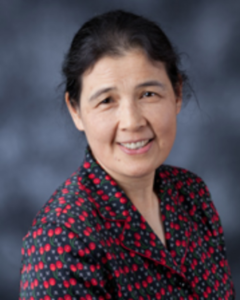
Changming Duan, PhD.
APA Division 52 ‘Ursula Gielen Global Psychology Book Award’ (2022)
The mission of Division 52 is to advance psychology internationally as a science and profession, and through education and advocacy. In support of this mission, the Ursula Gielen Global Psychology Book Award is presented to the author(s) or editor(s) of a recent book that makes the greatest contribution to psychology as an international discipline and profession, or more specifically, the degree to which the book adds to our understanding of global phenomena and problems from a psychological point of view. Examples include psychological interventions at the micro- and macro-levels, multinational organizations, questions of mental health, pedagogy, peace and war, gender roles, contributions of indigenous psychologies to global psychology, textbooks that integrate theory, research and practice from around the globe, edited volumes integrating contributions from scholars around the world, and overviews of international and global psychology.
Inclusions and Exclusions
Nominations may include authored or edited volumes in any language. All submissions must be accompanied by a 2-page letter in English making a case for the book’s potential contribution to global psychology. Copyright must be 2022. Nominations may not include fiction and biographies.
Specifics of the Award
Winners will be announced in Spring 2022, presented with a certificate, and invited to give an address at the August 4-7, 2022 APA Convention in Minneapolis, MN. They will receive one full payment of the convention fee and a stipend of $500 to help fund their attendance at the convention.
Criteria
In judging the contribution of each book, the following set of guidelines will be used:
1. How creative and novel are the ideas expressed in the book?
2. How large and significant a contribution does the book make to psychology as a global discipline and profession?
3. Are the book’s contents international or global in nature?
4. Is the book scientifically rigorous and logically sound? Are its theoretical bases well supported and translatable into sound and ethical practice?
5. What is the literary quality of the work? Is it interestingly and well written? Is the audience for whom it is written explicitly stated and does it reach that audience?
6. Does the book maintain a clear focus on psychology as a science and practice?
Procedures
All nominations, accompanied by the 2-page letter, and three copies of the book, must be made by November 1, 2021, and sent to:
Daniel Kaplin, Ph.D.
Chair, Ursula Gielen Global Psychology Book Award
Psychology Department
St. Francis College
180 Remsen Street
Brooklyn, NY 11201, USA
e-mail: dkaplin@sfc.edu
Ursula Gielen (1916-1997, Germany) was vitally interested in the well-being of indigenous, persecuted, and poor people around the world, with a special emphasis on women and children. Her legacy and commitment to international concerns and human welfare continues through her children: Ute Seibold, a former foreign language secretary in Switzerland; Uwe Gielen, an international psychologist in the United States; Odina Diephaus, a former interpreter with the European Parliament in Belgium; and Anka Gielen, a counseling psychologist in Germany.
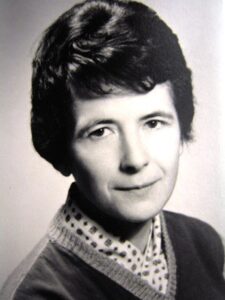 Committee Members:
Committee Members:
Daniel Kaplin, Ph.D., Chair
Florence L. Denmark, Ph.D.
Juris G. Draguns, Ph.D.
Michael J. Stevens, Ph.D.
Harold Takooshian, Ph.D.
Uwe P. Gielen, Ph.D. (ex officio)
Ursula Gielen Book Award Winners
2008 Award: Families Across Cultures: A 30-Nation Psychological Study. Editors: James Georgas (University of Athens, Greece), John W. Berry (Queen’s University, Canada), Fons J. R. van de Vijver (Katholieke Universiteit Brabant, The Netherlands), Cigdem Kagitcibasi (Koc University, Turkey), and Ype H. Poortinga (Katholieke Universiteit Brabant, The Netherlands).
2009 Award: Culture and Leadership across the World: The GLOBE Book of In-Depth Studies of 25 Societies. Editors: Jagdeep S. Chhokar (Indian Institute of Management, India), Felix C. Brodbeck (Aston University, UK), and Robert J. House (University of Pennsylvania, USA).
2011 Award: International Handbook of Cross-Cultural Counseling: Cultural Assumptions and Practices Worldwide. Editors: Lawrence H. Gerstein (Ball State University, USA), P. Paul Heppner (University of Missouri, USA), Stefanía Ægisdóttir (Ball State University, USA), Seung-Ming Alvin Leung (The Chinese University of Hong Kong), and Kathryn L. Norsworthy (Rollins College, USA).
2012 Award: Silencing the Self across Cultures: Depression and Gender in the Social World. Editors: Dana C. Jack (Western Washington University, USA), and Alisha Ali (New York University, USA).
2013 Award: Overcoming Evil: Genocide, Violent Conflict, and Terrorism. Author: Ervin Staub (University of Massachusetts at Amherst, USA).
2014 Award: Fathers in Cultural Context. Editors: David W. Shwalb (Southern Utah University, USA), Barbara J. Shwalb (Southern Utah University, USA) and Michael E. Lamb (University of Cambridge, UK).
2015 Award: The Oxford Handbook of Multicultural Identity. Editors: Verónica Benet-Martínez (Universitat Pompeu Fabra, Barcelona, Spain) and Ying-Yi Hong (Nanyang Technological University, Singapore).
2016 Award: Organizations and Management in Cross-Cultural Context. Authors: Zeynep Aycan (Koç University, Istanbul, Turkey), Rabindra N. Kanungo (McGill University, Montreal, Canada), and Manuel Medonça, McGill University, Montreal, Canada).
2017 Award: The ITC International Handbook of Testing and Assessment. Editors: Frederick T. L. Leong (Michigan State University, USA), Dave Bartram (CEB Talent Measurement Lab, USA), Fanny M. Cheung (The Chinese University of Hong Kong, China), Kurt F. Geisinger (University of Nebraska, USA), and Dragos Iliescu (University of Bucharest, Romania).
2018 Award: The Cultural Nature of Attachment: Contextualizing Relationships and Development. Editors: Heidi Keller (University of Osnabrück, Germany) and Kim A. Bard (University of Portsmouth, UK).
2019 Award: Parenting from Afar and the Reconfiguration of Family Across Distance. Editors: Maria Rosario T. de Guzman (University of Nebraska at Lincoln), Jill Brown (Creighton University) and Carolyn Pope Edwards (University of Nebraska at Lincoln).
2020 Award: Rule Makers, Rule Breakers. Author: Michele Gelfand (University of Maryland).
2021 Award: The Cambridge Handbook of Psychology and Human Rights. Editors: Neal Rubin (Adler University) and Rosanne Flores (Hunter College).
The Research Initiatives Working Group at the APA Interdivisional Task Force on the Pandemic. How to Advance Multidimensional Covid-19 Scholarship from a Global International Perspective
Rita Rivera
The Research Initiatives Working Group is part of the COVID-19 interdivisional task force compromised by several APA divisions. The Research Initiatives Working Group (RIWG) was developed after many task force members expressed that research is a priority in their academic life and professions. Social distancing and stay-at-home guidelines imposed at the beginning of the pandemic interrupted research endeavors in various disciplines at universities, hospitals, and clinics across the world. Therefore, one of the main objectives of the RIWG is to facilitate communication between researchers across the globe, specifically by compiling a collection of the currently available knowledge base on the psychological impact of Covid-19 from a multidisciplinary and international perspective. Through this communication, the RIWG has been able to inform students, researchers, policymakers, practitioners, stakeholders, and other professionals on the multidimensional impact of the pandemic and related psychological treatment, prevention, and intervention resources.
Moreover, the RIWG has been advancing the knowledge base through research projects and developing and disseminating newly published materials and resources. These include peer-reviewed articles, reports, calls for papers, funding opportunities, conferences, webinars, symposia, and a Covid-19 research map. The Covid-19 research map is one of the most relevant products of the RIWG; it contains over 100 projects around the globe and continues to be enriched by the work of scholars conducting relevant work in international, multidisciplinary, and global settings. The RIWG’s primary focus has been an international project on understanding the psychological impact of the pandemic in young people and established adults. This initiative, currently named the International and Multidimensional Perspectives on the Impact of Covid-19 (IMPACT-C19), involves over 100 members across major geographical regions in over 60 countries. Although the pandemic has certainly brought challenges and changes to the research and academic environment, the RIWG strives to promote the collection and dissemination of research so that professionals worldwide can share experiences to understand better and systematically analyze the consequences of this pandemic. The pandemic is a global crisis. Thus, the RIWG hopes to continue this fruitful international collaboration and help to provide insights on how to support individual’s well-being during these challenging times and in the aftermath of this pandemic. If you would like to know more about the RIWG and/or the IMPACT-C19 project, please contact the group chairs Rita Rivera at ritamrivers@gmail.com and/or Radosveta Dimitrova at dimitrova.radosveta@gmail.com
International and Multidimensional Perspectives on the Impact of Covid-19 (IMPACT-C19)
The Research Initiatives Work Group (RIWG), part of the COVID-19 interdivisional task force, promoted the project entitled “International and Multidimensional Perspectives on the Impact of Covid-19 (IMPACT-C19).” The IMPACT-C19 project is a research initiative with the scope to examine the impact, perceptions, and experiences of Covid-19 among young people and established adults in a multidimensional and international perspective. The project started with group members of the RIWG who were enthusiastic to promote science and knowledge on the pandemic. There are currently over 100 members, which include developmental, social, and cross-cultural psychologists, and they have been collecting data in over 60 countries, including Australia, Bangladesh, Brazil, Bulgaria, China, Colombia, Costa Rica, Cyprus, Czech Republic, Germany, Greece, Honduras, India, Indonesia, Iran, Italy, Japan, Lithuania, Malaysia, Mexico, New Zealand, Nigeria, Pakistan, Peru, Poland, Portugal, Puerto Rico, Romania, Serbia, Singapore, Slovakia, Slovenia, South Africa, Spain, Sweden, Taiwan, Turkey, United States, Vietnam, Zambia and Zimbabwe. The target samples are emerging adults aged 19-29, established adults aged 30-45 and youth aged 16-18.
On each site, data are being collected with online platforms prior ethical clearance and adequate language adaptation. The members of various countries have been working to disseminate knowledge of such multidisciplinary expertise as well as apply new measures on Covid-19 to provide solid psychometric and methodological evidence of measurement tools internationally. There is a general agreement for collaboration and data use among all partners to establish data holders, data sharing, storage, rights, obligations, authorship and types of collaboration. The long-term prospects see a range of products such as special issues in major journals, short reports in various newsletters, edited book/s at major publishers, and grant applications. If you would like to know more about the IMPACT C-19 project, please contact Rita Rivera at ritamrivers@gmail.com and/or Radosveta Dimitrova at dimitrova.radosveta@gmail.com
Call for Collaboration on
“The Pandemic-Prejudice Link: Understanding How and When Covid-19 Threat Leads to Prejudice Against Refugees”
Arzu Karakulak, Bahcesehir University, Turkey
With its’ high mortality risk, severe restrictions, economic losings and lack of control, the Covid-19 outbreak has evoked major perceptions of Covid-19 threat which may nurture violence, ethnocentrism, extremism and prejudice against minority group members. Yet, reactions to Covid-19 threat are manifold. Not every individual, and not every society reacts with enhanced prejudice against minority group members. For instance, contrary to the notion that threat would fuel prejudice, recent evidence from Turkey suggests that -with the Covid-19 outbreak- tolerance towards immigrants has increased, while the perceived tensions between Syrians and the Turkish have decreased (INGEV, 2021).
My research project is tackling this issue. By combining prominent social-psychological (i.e., Social Identity Theory & Integrated Threat Theory) and evolutionary approaches (i.e. Pathogen Avoidance Model), my research aims at understanding when and how the perception Covid-19 threat may promote (or alleviate) prejudice against refugees among emerging adults (18-30 years) living in different receiving countries. Sensitive to the concerns of both “sides”, the proposed project will identify the psychological and socio-cultural conditions that reduce prejudice against refugees while simultaneously promoting the well-being of mainstream emerging adults. First, a link between Covid-19 threat, prejudice and well-being via national identity, and second via perceived vulnerability to disease is proposed; both in relation to possible moderating factors.
The proposed research has several academic and political implications. First, the world is in a “state of emergency” and it is so far unclear whether traditional psychological approaches will prove useful under the current circumstances. Second, addressing these issues today, in the face of the Covid-19 outbreak and the rising orientation toward populistic and right-wing ideologies, seems most urgent than ever. Knowledge gained from this project will not only be relevant for the challenges we face in relation to the Covid-19 outbreak, but will also equip scientists and policy makers with strategies to better manage future global upheavals, for instance in relation to climate change’s effects on our globalized economies and the dynamics of scarcity.
Wide dissemination of the findings targeting both academic networks, policy makers, field workers and the general audience via a project webpage, scientific papers, conference presentations, webinars, brief reports and workshops is planned. The implementation of this project (in Turkey) will be realized as part of my Mercator-IPC Fellowship (https://ipc.sabanciuniv.edu/en/about-55cfa89a) and start in September 2021. In order to increase the impact of this project, and to allow in-depth cross-national examination I am looking for collaborators across the globe to join the described research. If you are interested to join, and if you have access to collect data from 300-400 emerging adults residing in a country that hosts a substantial number of refugees to complete a 15-20 minutes online questionnaire, I would be more than happy if you contact me via arzu.karakulak@eas.bau.edu.tr. I am happy then to share more information about the project with you.
Early Career Psychology (ECP) Corner!
Greetings and salutations, Early Career Psychologists from your ECP trio—Dr. Cristina Cruza (past chair), Dr. Antonio Valdivia (present chair), and Dr. Lora Erickson (chair-elect). We hope that you are all doing well, and we are looking forward to interacting with you at the APA annual convention virtually this year! We hope that the virtual nature of the program continues to increase participation and inclusiveness for all, especially our international colleagues who may not otherwise be able to attend the convention. We have been busy planning and getting ready to see you all for some exciting and engaging suite programming experiences from 6:30-7:30 pm EDT (New York Time) on Friday, August 13. These include: a Night at the Oscars where we will honor our two ECP award winners, engage in an interactive panel discussion on “How Did You Get That Job?,” plus we have incorporated time for social engagement and networking for all that attend. If you cannot make the scheduled suite time and want to connect with your ECP leaders, please feel free to join our special What’sApp group, just for Div. 52 ECPs, by scanning the QR code below:
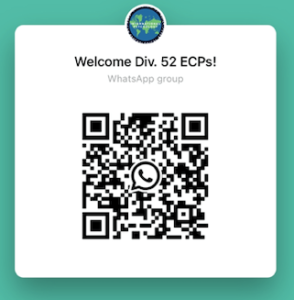
We are also happy to connect with you via WhatsApp, even if you also plan to attend the APA suite programming.
Below, please find our Zoom link for the APA virtual convention. You do not have to be registered for the APA annual convention to attend our specific suite event, as we aim to increase the inclusivity of ECP involvement within our division globally:
https://us02web.zoom.us/j/4675190766?pwd=TGw3TTFkcW5sclRJc1RTVEVacFI4dz09
Finally, we would love to learn more about what our ECP colleagues from around the world are presenting at this year’s APA annual convention. We are interested in everything you may be engaged in– your posters, symposiums, round tables, lightening talks, service to the division and/or APA in general, workshops, and more. Please send an email to any (or all) of your elected ECP chairs so that we can proudly feature your work from the 2021 APA annual convention for a shout out in a future IPB publication:
Antonio: juan.valdivia@fulbrightmail.org
Lora: lerickson@thechicagoschool.edu
Cristina: cristcru@gse.upenn.edu
We are proud to serve as your elected ECP trio and look forward to receiving updates on your amazing work as ECPs, representing International Psychology in APA Division 52.
Message from 2021 Student Chair
Daniel Balva
Div. 52 Student Chair 2021
Dear Division 52 Student Members,
I hope this newsletter finds each of you safe and well as we move into the mid-year point of the term. In 2018, the American Psychological Association of Graduate Students (APAGS) proposed student voting privileges within APA, which upon being voted on in 2019, was unfortunately 58 votes short of passage. Advocacy from students within APA led to the proposal being voted upon again in 2020, and with hard work, dedication, and perseverance, the vote ended up passing, thus resulting in voting privileges for graduate students within APA. This was an exciting and historic moment for student members of APA to have their voices heard within the association, and this monumental passage led to similar proposals having been put forth within other APA divisions.
In 2020, our Past Student Chair, Ankita Nikalje, brought this concern forth to Division 52’s Executive Board and expressed the importance of student voting privileges. In the time since, our Student Committee has worked diligently alongside APAGS leadership and Student Chairs from other APA divisions and international psychology associations to propose similar voting privileges within Division 52. Our data showed that other divisions and organizations with full student voting privileges included APA’s Division 1: Society for General Psychology, Division 2: Society for the Teaching of Psychology, Division 3: Society for Experimental Psychology and Cognitive Science, Division 9: Society of the Psychological Study of Social Issues, Division 19: Society for Military Psychology, Division 41: American Psychology-Law Society, Division 45: Society for the Psychological Study of Culture, Ethnicity and Race, and Division 48: Society for the Study of Peace, Conflict and Violence: Peace Psychology Division, in addition to NLPA (the National Latinx Psychological Association), SIP (the InterAmerican Society of Psychology), and AMENA-Psy (the Arab, Middle Eastern, North African Psychological Association).
Our proposal for student voting privileges required a proposed bylaw change, and fortunately, we had unanimous support from our division’s Executive Board to propose such a change to the membership. As one might imagine, concerns surrounding student voting are understandably present within organizations, which, in consulting with student leaders from other divisions and organizations, have commonly included beliefs that students may not be experienced or knowledgeable enough to participate in voting related matters or that large student blocs may impact the status quo of voting within organizations. However, it is the strong belief of our Student Committee, of the student leaders from APAGS, and fellow student leaders from other APA divisions and organizations that voting privileges convey a message that organizations are invested in supporting and hearing from students—and that such privileges demonstrate that the future leaders in psychology are in fact a priority. As APA’s only international division, and as an organization that values cultural inclusivity, respect for differing opinions and perspectives, and international and global connections relations, amplifying student voices seemed to align closely with our division’s mission and purpose.
As the vote went forth to the Division 52 membership, we were informed on June 29, 2021, that the motion, “Student Affiliates of Division 52 shall be permitted to vote in all elections for Division officers and also allowed to cast votes in other Division affairs” passed by 67% in favor of the bylaw change! Let’s let that soak in for just a moment!
So what exactly does this vote mean for students, one may ask? And why is this so important to the student membership? These privileges—the very privileges of being able to use one’s voice to vote—show that the division, our division of global psychologists, recognizes and values student voices from around the world, and that is no small feat. Students often experience power differences throughout their educational and clinical training and in various settings in which they may find themselves practicing or working. To know that our esteemed colleagues and mentors value our insight, perspectives, and opinions, is humbling, to say the least, and it makes students feel like important and contributing members to a division that is home to so many of us. Not to mention, Division 52’s approval of student voting privileges has set an important precedent for other APA divisions and organizations across the globe to further value the opinions and perspectives of student members—those who form the future of our profession. Division 52 now stands on a meaningful list of divisions and organizations who show their commitment to students, and that is not something to be taken lightly.
Thank you to our membership who have supported, who support, and who continue to support our students in our academic and professional endeavors, and who support our students as contributing members to Division 52. While I recognize that not everyone may be in favor of student voting privileges, I would like to also express my appreciation for the ability to engage in open dialogue to listen to one another, and to collaboratively work together to support all of our division’s members and to support the good and welfare of Division 52. It is the very ability to have such discussions with one another that makes our division as wonderful as it is.
A special thank you is warranted to both our division’s leadership and membership for amplifying our student voices. As always, from the bottom of my heart, thank you so much for your trust, belief, and support of our student members, and for placing your faith in the future of our division and in the future generation of international psychology. Our student members from around the world are a wonderful group of talented and hardworking individuals who will continue to work to advance our division, our profession, and society at large.
And to our students, if I may echo in the powerful words of Kate Sheppard, “Do not think your single vote does not matter much. The rain that refreshes the parched ground is made up of single drops.” Here is to taking pride in our student voices and to moving forward, together.
Sincerely,
Daniel Balva, M.S., NCC, CRC
Student Chair, APA Div. 52, International Psychology
Student Section of Division 52 Website
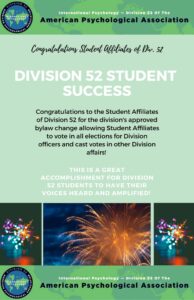
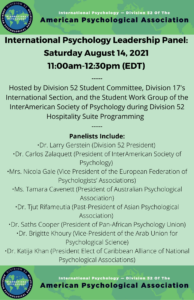
Division 52 May and June Student Spotlight

Lisseth London, is an Afro-Latina currently concluding her PhD in International Psychology with an emphasis in Trauma Service at The Chicago School of Professional Psychology. Her dissertation is a qualitative interpretive phenomenological analysis (IPA). The analysis looks at to what extent incorporating faith-based indigenous practices into traditional mental health care by Ghanaian mental health professionals is being used to help indigenous people of Ghana in need of psychological services and if collaborating is feasible, per their perception of the problem identified in the Mental Health Act 2012.
Ms. London has been implementing a Trauma Informed Resilient environment globally. Her focus is to build stronger organizations, individuals, and communities through Trauma Informed education, training, and advocacy. Ms. London’s desire to help implement a holistic Trauma Informed Resiliency Training© (TIRT) approach in organizations globally targeting communities facing traumatic experiences and challenges, such as: human trafficking & exploitation; women and child violence; immigration, migration, internally displaced persons (IDP); socioeconomic hardship; environmental tragedies; racial barriers among BIPOC groups; and more. Ms. London trainings has given her the opportunity to collaborate with organizations in the USA, Canada, Mexico, Panama, Peru, Brazil, South Africa, Israel, Nigeria, Zambia, Zimbabwe, Ghana, and Sierra Leone. She is currently consulting at the House of Hilkiah Foundation in Benue State, Nigeria bringing awareness to the fight towards combating human trafficking and exploitaion in IDP camps; SparkLife International SI an organization in Hohoe Volta Region, Ghana seeking to elevate the statuses of women,children, and youth by designing ways to promote resiliency, innovation, and technology to create leaders of change; and the Federation of International Gender and Human Rights advocating for human rights globally. Ms. London has also published reflection pieces in both Division 52 and Division 56. You can find her pieces here:
Div. 52- http://traumapsychnews.com/wp-content/uploads/2020/08/TPN-Summer-2020.pdf
Div. 56- https://div52.net/ipb-2021-25-1/

Ana Hill (she/her/ella) is pursuing her Ph.D. in Counseling Psychology at the University of Georgia. After completing a master’s degree in Counseling and Higher Education from East Tennessee State University, Ana decided to teach abroad in South Korea and Guatemala for a few years. As a result of her international work, travel, and participation in global experiences, Ana quickly joined Division 52 to further fuel her interest in international topics. Currently, Ana serves as a student committee member for Division 52. Ana’s clinical and research interests include globalization of psychology, ethnic and racial identity development, the influence of heritage languages, and student-athlete populations. Ana will soon be heading to Michigan State University CAPS to complete her internship year. First and foremost, she is working towards defending her dissertation so her research can inform and develop an evidence-based practice to understand the identity development process for 2.5 generation clients.

Aashna Banerjee (she/her) is pursuing her Ph.D. in counseling psychology at Ball State University in Indiana. Originally from India, Aashna currently serves on the student committee for Division 52, the newsletter team for Division 48, and is the student member for Section for Advancement of Women in Division 17. Aashna’s clinical work strives towards the liberation and empowerment of diverse clientele. Additionally, her research focuses on the intersection between international psychology, counseling psychology, and peace psychology. Currently, she is developing her dissertation and hopes to use positive psychology principles to reduce sexual violence amongst women in India.
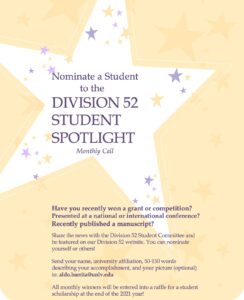
Statement from the 2021 William Gudykunst Outstanding Book Award Committee
This year the committee received four nominations for the 2021 William Goodykunst Outstanding Book Award, of which three met the criteria for the award, i.e. they (a) addressed important issues for intercultural research; (b) presented strong argument and evidence; and (c) offered insights for the advancement of intercultural research. This made the committee’s task challenging, but it is a sign that the field is growing in sophistication and diversity of foci.
The committee chair would like to extend her gratitude to Prof. Jane Jackson, for her dedication to this committee not only in 2021 but also in previous years,and to Profs. Zhu Hua and Irina Golubeva, new members who provided excellent evaluations.
After giving serious consideration to the merits of each book, the majority of committee members decided that we should present IAIR’s Outstanding Book Award (for best book published between 2019 and 2021), to two great contributors to the field of intercultural relations, Dan Landis and Dharm P.S. Bhawuk for their work in editing The Cambridge Handbook of Intercultural Training, fourth edition.
Dan Landis is an Affiliate Professor of Psychology, University of Hawaii, U.S. A., and Founding President and Fellow, of the International Academy for Intercultural Relations (IAIR) , as well as Founder and First Editor of the International Journal of Intercultural Relations and Dharm P.S. Bhawuk is Professor of Management, Culture, and Communication Psychology, University of Hawaii, U.S.A. and IAIR’s Founding Fellow.
Intercultural training broadly conceived, has constituted a core element of scholarship and practice in intercultural relations for approximately forty years. Thus the subject matter of thus volume is central to IAIR’s mission.
The 2020 edition offers authoritative chapters focusing on I) Theoretical foundations of Intercultural Training; II) Practice of Intercultural Training, III) Indigenous Psychology and Intercultural Training, IV) New Interdisciplinary approaches to Intercultural Training, and a concluding chapter on V) Intercultural Training for the New Global Village: Future Research Directions. Its 25 chapters cover culture-general as well as culture-specific issues of intercultural training in the past, present and future, and were written by experts from the fields of Psychology, Education, Business, and Communication (most of them academics in U.S. Universities) as well as by experienced practitioners.
This 757-page volume, was dedicated to the late Harry C. Triandis, winner of IAIR’s first Lifetime Achievement Award in 2004, a pioneering scholar in intercultural relations and in cross-cultural psychology, and a kind human being who mentored and guided many of us in this field.
As has happened with earlier editions, the fourth edition of the Handbook of Intercultural Training will become a crucial reference in intercultural training, and will be used by scholars, educators, graduate students, practitioners and others interested in the subject matter. It is essential reading for all those interested in researching, educating, and preparing individuals for understanding and interacting effectively with persons from a different culture, something which is becoming ever more important in our world.
As Adam Komisarof (Professor of Intercultural Communication and Acculturation. Keio University, Japan and IAIR’s President Elect) stated in his letter nominating The Cambridge Handbook of Intercultural Training, fourth edition, previous editions of the Handbook of Intercultural Training (published in 1983, 1996, 2004 and 2020) “literally created the field of intercultural training.”
Prof. Komisarof further stated that “The Handbook ambitiously draws together a vast array of diverse, yet relevant theories and their applications which impact intercultural training. One set of chapters covers indigenous literature that is useful in developing cultural insights for working in Brazil, Russia, India, China, and Japan. There are also chapters that examine how foundational knowledge in neuroscience, affective science, swarm intelligence, and religious studies influence the processes of intercultural interactions and dialogue. Yet other chapters provide reviews of the literature on intercultural training and related disciplines such as counseling and expatriate management. Thus, this volume accomplishes the leviathan task of fleshing out the theoretical foundations of intercultural training, bringing together rich, informative sources both from other fields and a wide variety of cultures to supplement current knowledge, and identifying how the field can flourish worldwide both in terms of research and practical applications. It is a landmark contribution to intercultural training and related fields, which is why Cambridge University Press, a publisher synonymous with excellence (and the world’s oldest university press), has published this volume.”
The following scholars and practitioners in the field have also commented on the importance of this remarkable volume:
“It truly is a key springboard for training and research in the current age of identity. It comprehensively presents two crucial elements: what we know about effective intercultural training theoretically, methodologically, and empirically, and what we don’t know. This is an essentials reference for practitioners, teachers and researchers.”
Cindy Gallois, Emeritus Professor of Psychology, University of Queensland, Australia.
“This handbook is both a classic and contemporary highlight in intercultural training research, and practice. The editors have set a cornerstone for the field by bringing internationally recognized scholars together. This volume is a must for every professional in the field.”
Claude-Helene Mayer, Professor of Industrial and Organizational Psychology, University of Johannesburg, South Africa.
“Since its first edition, this book has been an indispensable resource for scholars. practitioners and students who study or develop training methods to enhance intercultural competence. This edition, preserves its legacy: high quality analyses and sound guidance for practice or further research.”
Mark Mendenhall, J. Burton Frierson Chair of Business Leadership, University of Tennessee, U.S.A.
“Here is an essential update for interculturalists seeking synergy and human community in an age of invasive technology, ideological divides, ecological disasters, and corrosive us-versus them political populism. The authors force us to ask how we will rewire our brains to live together in a way that promises a synergistic future.”
George F. Simons, creator of Diversophy.
For all of the reasons stated above, we offer heartfelt congratulations to Dan Landis and Bhawuk for conceiving and shepherding this volume to publication, thus enriching our knowledge and advancing our field. Harry Triandis would have been extremely proud of their accomplishment, and so are we.
Respectfully submitted,
Jane Jackson, Professor Emerita, Chinese University of Hong Kong, China, Member
Zhu Hua, Chair in Educational Linguistics, School of Education, University of Birmingham, England, Member
Irena Golubeva, Associate Professor in Intercultural Communication, University of Maryland Baltimore County, U.S.A., Member, and
Rosita Albert, Professor Emerita, University of Minnesota, U.S.A., Chair,
IAIR Gudykunst Outstanding Book Award Committee, 2021.
International Perspectives in Psychology: Research, Practice, Consultation
New Frontiers for International Perspectives in Psychology: Building Forward Better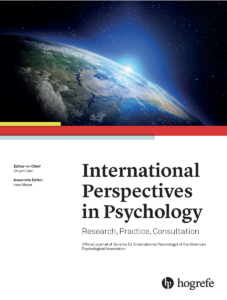
Stuart C. Carr, School of Psychology, Massey University, Aotearoa/New Zealand
Ines Meyer, School of Management Studies, University of Cape Town, South Africa
The journal’s Special Issue on Women During COVID-19 has been published! Below, please find the link to the Editorial by Special Issue Editors Judith Gibbons and Nancy Sidun.
https://econtent.hogrefe.com/doi/pdf/10.1027/2157-3891/a000025


Greetings Division 52 Members!
We want to thank you for your patience on the dissemination of this issue!
We hope everyone has a wonderful APA Virtual 2021 and continue to take the opportunity to connect and develop relationships with amazing Division colleagues! This issue’s primary purpose was to highlight the incredible programming at this years conference in addition to some collaborative calls as well as our ECPs and Student Corners!
Upcoming Issue: As we did last year, our October issue will focus on reflecting on the past year and on the APA conference. So, while you are at APA Virtual this week please take note and think about any events or moments that you would like to communicate through the October/fall IPB! We invite reflective pieces, photo pieces, or any other creative means of communication, along with our typical submission requests.
 Loading...
Loading...
 Loading...
Loading...
Please email us your submissions for our October issue, questions, or other ideas at ipbdiv52@gmail.com. The deadline for October issue will be September 15th.
Best,
Steve and Joyce
My Garden, Our Roots
Author: Natina L. Roberts, M.A.
I am a creative, driven, health-sciences professional with 15+ years’ experience in psychology, mental health advocacy and teaching. I have been involved in safety, wellness and self-sufficiency initiatives for diverse community groups (nationally and internationally). An Atlanta, Georgia born native, currently seeking a doctoral doctorate in Family Psychology (A concentration with Burmese forced migrant families) at the University of Auckland in New Zealand, I am always keeping myself emersed in creative academic pursuits that help amplify the voice of those who do not fit the “dominant narrative”; myself included.
Description:
This piece is a modified version of the poem in my doctoral thesis Acknowledgements section. It highlights the need to move towards gathering and understanding collaborative narratives to realize impacts of shared lived experiences on groups. It references the COVID-19 pandemic but delves deeper into social plagues faced today. In particular, given the recent military coup in Myanmar, I share insights on making collaborative, family narrative in research with forced migrant families who have resettled in New Zealand (from Myanmar). I showcase how they are actively contributing to the advancement of understandings and attitudes of Family through their shared lived experiences of forced migration. It canvases interesting empirical and theoretical grounds for thinking about how family is a fluid concept and how the precepts defining family need to be reconsidered to have a more inclusive understanding of families today.
Poem
My Garden, Our Roots
My garden: lush with assurance, belief and sanguinity,
How did it come to this, how did my story come to be?
“Once upon a time”, a colloquial signaling the reminiscence of a magical history,
Is not needed here because this story starts with vestiges of intergeneration trauma; not merely an enchanted recollection of yesterday.
Opening with the navigation of times’ demanding sea,
We look at what was, what is and what can be.
Reflecting on the antiquity of Shakespeare’s darling buds of May,
Today, these buds precipitate their opening by rooting in the coarse ground of autocratic decay.
I can’t help pondering what can grow here and what conflicts give rise to the creation of us,
It makes me question who is allowed to determine the connotation of just.
Untenable and unfamiliar circumstance leave us in mental and physical lockdowns,
Leaving us uncertain with no true north, only in an indeterminate limbo meandering around.
Frustration, anguish and hopelessness cause us to blame and be blamed,
Our actions merely a motivation from the renunciation of hoping losses can be reclaimed.
Righting wrongs becomes a challenging task,
One that is sardonically associated with untouchables and outcasts.
Whose story is told and how do we know what is truth?
How do we heal from lies, if only by applying the balm of silenced narratives, to rebuild and soothe.
Now what is it to capture these stories and get to their crux,
Is it finding the pulse of history; to attentively hear, actively listen and openly discuss?
Doing this, we learn what embodies the soul of a story, what makes people act,
We begin to see the possibilities for growth that others deeply lack.
Living these stories is to feel the intimate bonding of bliss and burden’s pleasure,
And as Prophet Muhammad (صلى الله عليه وسلم) said, it is a consciousness telling us live today as it is our last, but also like we will live forever.
Continuous recognition of history is given in every storytelling factor,
But do not believe these lens are a blind reverberation of parental antimatter.
Rather, it is collaborative musings of life journeys that guide the processes of self-development and knowing what to trust,
It is through questioning and challenging that the spike of ignorance begins to break down to dust.
Your roots: behind in the controlling of wars between blood, fellows and human hostilities,
Is this how you began to create and redefine family?
Taking what was left and challenging societal norms,
You begin to determine your worth and use it as a shield to weather storms.
My roots: strength and hope simultaneously cultivated and overweeningly winnowed,
This is the result of inheriting a life in ancestral soil packed with the fertilizer of Jim Crow.
Banana and mayonnaise sandwiches, nostalgic of Dee’s time in an oppressive regime,
Times reflecting how we were asylum seekers in other’s sycophantic dreams.
Seeing and creating have been daunting for us, but not to the point of a standstill,
Together we march through the banally infused ink of the narrator’s invisible quill.
No matter how stifling the cultivation of story is our voices will sing,
With each chapter created, we are actively separating ourselves from other’s puppet strings.
Ventriloquy notwithstanding, variants of the discrimination pandemic have created regurgitators of fascistic ideals that bask in a supremist sun,
Overcoming these contagions requires uprooters to apply who they are and promote a life of do no harm.
Seek to glean a fissure of understanding into the hallowed and forgotten spaces of the world,
Accept that your understanding of family should go beyond blood and grow to the unlearned.
From the melanin I have inherited, to the growth of my inner voice,
I thank those of you who share my blood, and some of you who do not, you are my family of choice.
Words cannot express thanks for the two-fold enigma of approval and disapproval you are,
It has motivated the tilling of soil in the ruins of agonistic-soaked farms.
The weeds of hate, defilement and injustice will always attempt to burrow,
But with an inherited thick layer of protective mulch, roots hold firm and darling buds sprout and grow.
Our roots: Telling our stories on the canvas of today there is no need to have restraint on any account,
In the words of Raitt, truly, “Let’s give em’ somethin’ to talk about”.
